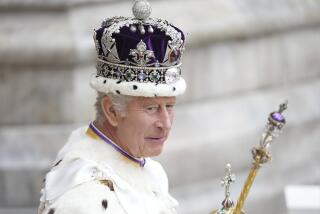Liechtenstein Ruler Stirs Up a Tempest
- Share via
VADUZ, Liechtenstein — Long live Liechtenstein,
Flourishing on the young Rhine, happy and true.
Long live the country’s prince,
Long live our fatherland, through the bond of brotherly love,
United and free.
--Liechtenstein
national anthem
*
His Serene Highness Prince Hans-Adam II of Liechtenstein cheerily ushers a visitor into his office in the family’s 13th-century castle.
The 54-year-old prince then submits with patience, charm and humor to a 55-minute interview about his views, his relations with his people and his businesses. His holdings, worth an estimated $3.8 billion to $4.4 billion, include an American rice company, RiceTec, vast estates, an international bank and an art collection.
Patience? Charm? Humor?
Those are three words that don’t spring readily to the lips of the prince’s critics when they describe Hans-Adam’s demands for new powers and his threat to leave the Alpine principality and his 32,000 subjects if he doesn’t get them.
“He doesn’t discuss. He just decides,” says Adolf Ritter, a teacher and member of the left-wing Free List party. “He doesn’t listen to us, but expects to be obeyed. That doesn’t belong to a democracy based on equality.”
Hans-Adam became the 13th Ruling Prince of Liechtenstein in November 1989 upon the death of his universally adored father, Franz Josef II, who kept the principality out of Adolf Hitler’s clutches and transformed the impoverished farming nation into a wealthy industrialized one.
Hans-Adam has retained his father’s tradition of inviting the entire population to the castle for drinks and snacks on the Aug. 15 national day. He occasionally strolls through Vaduz without bodyguards, attends social functions and jogs.
But while professing that “my heart is in Liechtenstein,” the prince is threatening to move to neighboring Austria, where his family lived until 1938 and where he still owns large estates.
The 1921 constitution says that Liechtenstein is a monarchy “on democratic and parliamentary foundations” and that the “authority of the state is anchored in the Ruling Prince and in the People.”
Hans-Adam has sweeping powers: He has the final say on any law, and he can dissolve Parliament and call early elections. At the same time, the Liechtenstein people can challenge laws by gathering 1,500 signatures to force a referendum.
But the prince says the constitution is ambiguous on disagreements between him and Parliament or the people. He has proposed amendments on issues such as emergency rule and the nomination of judges.
The prince’s actions have already gotten him into trouble with the European Court of Human Rights. In October, the court in Strasbourg, France, ruled Hans-Adam had violated the right to freedom of speech by refusing to accept the nomination of a judge, Herbet Wille, who disagreed with him in the constitutional dispute.
“The monarchy now is in a difficult situation,” Hans-Adam says. “If the monarch fulfills his obligations under the constitution, the politicians say he’s undemocratic. If he doesn’t fulfill his obligations, the politicians say he doesn’t fulfill them. Whatever he does, he is attacked.”
The 25-member Parliament wants more limited change.
Efforts to solve the deadlock are due to resume this year. But nobody is optimistic.
“The discussion has become too emotional from the prince’s side,” says Prime Minister Mario Frick. “He doesn’t just say, ‘I want a solution,’ but also, ‘If they don’t accept, I’m off.’ ”
It is widely expected that the prince will carry out his threat to gather the necessary signatures for a referendum to change the constitution. If he wins, he will stay in Liechtenstein. But if he loses, he says, his family should be “free to do other things.”
“As long as we live here in such a small country, it would be very difficult to stay out of politics,” says Hans-Adam.
Critics denounce that stand as an effort to scare voters into backing the prince’s views. Liechtenstein has grown incredibly rich under the royal family’s patronage, and few people want to jeopardize that by his leaving.
Hans-Adam says that once the constitutional issue is settled-- hopefully in 2001 or 2002--he wants to hand over power to his oldest son and heir, Alois, now 31.
The prince is adamant there will be no ruling Princess of Liechtenstein, despite criticism that the royal family’s provision for only male succession violates sexual equality laws.
“The head of the family is also head of state and responsible for the family business. It is a very demanding job,” Hans-Adam says. “We are convinced out of our experience of hundreds of years that the role of the mother is very important for the next generation. If the mother doesn’t have time for the children, you put the next generation at risk.”
More to Read
Sign up for Essential California
The most important California stories and recommendations in your inbox every morning.
You may occasionally receive promotional content from the Los Angeles Times.













